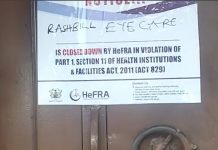Constitutional Lawyer Justice Srem-Sai has praised Kenyan President William Ruto’s decision to veto the Financial Bill 2024, citing it as a valuable lesson for Ghana’s President Nana Addo Dankwa Akufo-Addo.
Despite initial plans to sign the bill, Ruto reversed course after widespread protests and public outcry, demonstrating a commitment to listening to the people’s concerns.

Ruto had initially explained the necessity of the taxes for priority areas like agriculture, education, and health insurance.
However, he ultimately conceded to public pressure, choosing not to sign the bill and instead withdrawing it.
This move came after the Kenyan Parliament approved the deployment of military forces to support police during ongoing protests, a decision that raised legal and constitutional concerns.
Justice Srem-Sai notes that Ruto’s approach stands in contrast to more dramatic measures, such as challenging the bill’s validity in court or evading service of the bill from Parliament.
Instead, Ruto simply complied with Kenya’s supreme law by accepting service of the bill, clearly indicating his refusal to assent, stating objections, and providing reasons within the constitutionally stipulated timelines.
This approach, Srem-Sai argues, demonstrates a commitment to the rule of law and democracy.
By prioritizing the people’s concerns and following constitutional procedures, Ruto has set an example for other leaders to follow.
As Srem-Sai concludes, “Democracy can be less stressful” when leaders prioritize the rule of law and the people’s voices.























































![[FREE FREE MONEY] Predict and Win a Guaranteed GH¢200 From Us EVERY WEEK](https://wordpress.ghanatalksradio.com/wp-content/uploads/2022/02/Predict-and-Win-Final-09-03-2021-218x150.jpg)
![[Predict & Win – 8th/Oct.] WIN A Guaranteed ¢200 From Us This Week](https://wordpress.ghanatalksradio.com/wp-content/uploads/2021/10/maxresdefault-16-218x150.jpg)
![[Predict & Win – 2nd] WIN A Guaranteed ¢200 From Us This Week](https://wordpress.ghanatalksradio.com/wp-content/uploads/2021/09/maxresdefault-50-218x150.jpg)
![[Predict & Win – 25th] WIN A Guaranteed ¢200 From Us This Week](https://wordpress.ghanatalksradio.com/wp-content/uploads/2021/09/maxresdefault-36-218x150.jpg)
![[Predict & Win – 18th] WIN A Guaranteed ¢200 From Us This Week](https://wordpress.ghanatalksradio.com/wp-content/uploads/2021/09/maxresdefault-23-218x150.jpg)








![[National cathedral] See full list of churches that have contributed since 2018](https://wordpress.ghanatalksradio.com/wp-content/uploads/2020/09/Ghana-National-Cathedral-GhanaTalksRadio-100x70.jpg)



